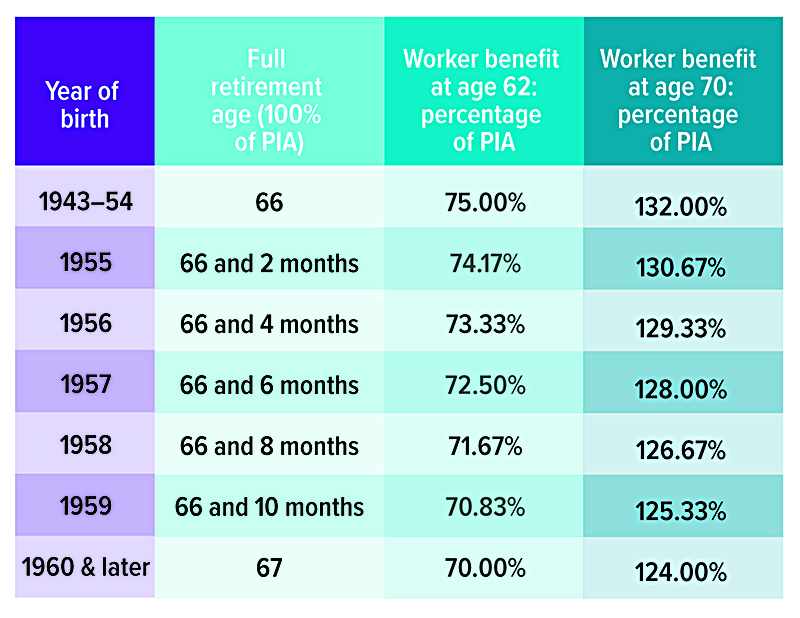Social Security 101

Social Security is complex, and the details are often misunderstood even by those who are already receiving benefits. It's important to understand some of the basic rules and options and how they might affect your financial future.
Full retirement age (FRA)
Once you reach full retirement age, you can claim your full Social Security retirement benefit, also called your primary insurance amount or PIA. FRA ranges from 66 to 67, depending on your birth year (see chart).
Claiming early
The earliest you can claim your Social Security retirement benefit is age 62. However, your benefit will be permanently reduced if claimed before your FRA. At age 62, the reduction would be 25% to 30%, depending on your birth year. Your benefit may be further reduced temporarily if you work while receiving benefits before FRA and your income exceeds certain levels. However, when you reach FRA, an adjustment is made, and over time you will regain any benefits lost due to excess earnings.
Claiming later
If you do not claim your benefit at FRA, you will earn delayed retirement credits for each month you wait to claim, up to age 70. This will increase your benefit by two-thirds of 1% for each month, or 8% for each year you delay. There is no increase after age 70.
Spousal benefits
If you're married, you may be eligible to receive a spousal benefit based on your spouse's work record, whether you worked or not. The maximum spousal benefit, if claimed at your full retirement age, is 50% of your spouse's PIA (regardless of whether he or she claimed early) and doesn't include delayed retirement credits. If you claim a spousal benefit before reaching your FRA, your benefit will be permanently reduced.
Dependent benefits
Your dependent child may be eligible for benefits after you begin receiving Social Security if he or she is unmarried and meets one of the following criteria: (a) under age 18, (b) age 18 to 19 and a full-time student in grade 12 or lower, (c) age 18 or older with a disability that started before age 22. The maximum family benefit is equal to about 150% to 180% of your PIA, depending on your situation.
Survivor benefits
If your spouse dies, and you have reached your FRA, you can claim a full survivor benefit — 100% of your deceased spouse's PIA and any delayed retirement credits. Note that FRA is slightly different for survivor benefits: 66 for those born from 1945 to 1956, gradually rising to 67 for those born in 1962 or later.

You can claim a reduced survivor benefit as early as age 60 (age 50 if you are disabled, or at any age if you are caring for the deceased's child who is under age 16 or disabled, and receiving benefits). If you are eligible for a survivor benefit and a retirement benefit based on your own work record, you could claim a survivor benefit first and switch to your own retirement benefit at your FRA or later, if it would be higher.
Dependent children are eligible for survivor benefits, using the same criteria as dependent benefits. Dependent parents age 62 and older may be eligible for survivor benefits if they received at least half of their support from the deceased worker at the time of death.
Divorced spouses
If you were married for at least 10 years and are unmarried, you can receive a spousal or survivor benefit based on your ex's work record. If your ex is eligible for but has not applied for Social Security benefits, you can still receive a spousal benefit if you have been divorced for at least two years.
These are just some of the fundamental facts to know about Social Security. For more information, including an estimate of your future benefits, see ssa.gov.


